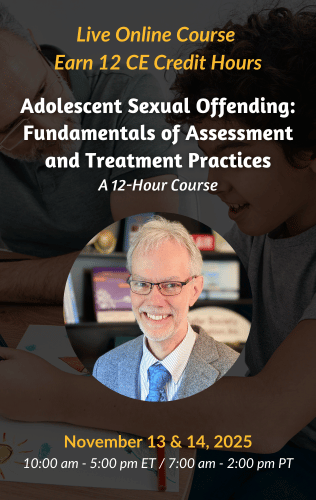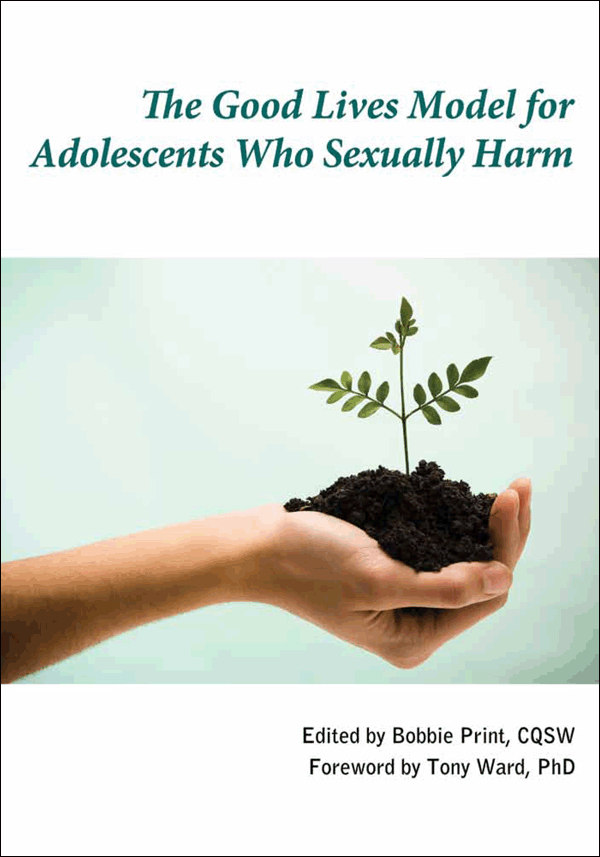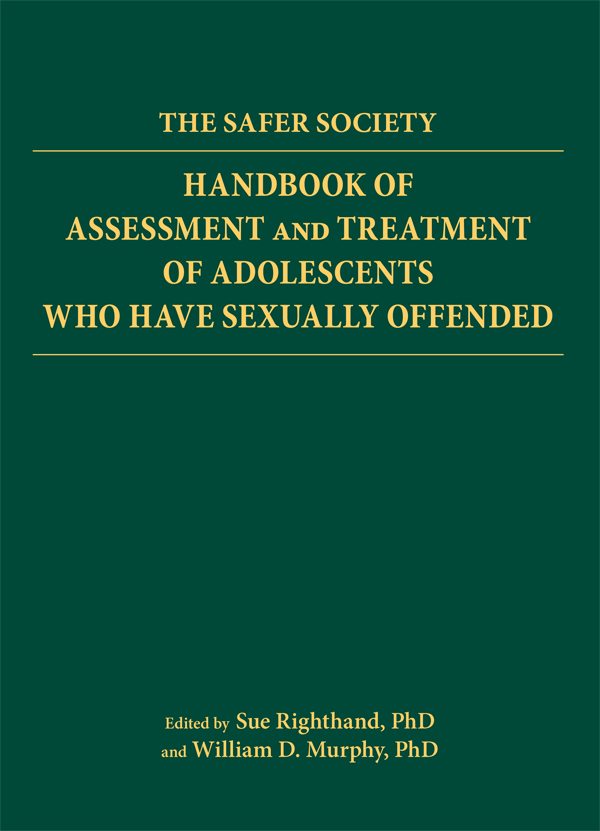Home / Shop / Online Trainings
Live Online Course - Adolescent Sexual Offending: Fundamentals of Assessment and Treatment Practices

- Description
Date: November 13 & 14, 2025
Time: 10:00 am – 5:00 pm (ET) / 7:00 am – 2:00 pm (PT)
Format: Live interactive training offered via Zoom
CE Eligibility: 12 Clinical CE Credit Hours
Presented by: David Prescott, LICSW, ATSA-F (See bio)
You must attend both live course sessions in their entirety and complete an evaluation to be eligible for CE credits. If you seek only psychology credits, the evaluation is optional, and you can remain anonymous.
Online Training Description:
Effective assessment and treatment of adolescents with sexual behavior problems requires specialized knowledge, practical skills, and a commitment to best practices. Whether you are new to this area of work or an experienced professional seeking to refresh your expertise, this two-day course offers a comprehensive, research-informed overview for clinicians, social workers, juvenile justice professionals, and others working with youths in outpatient and residential settings.
David Prescott designed this course to explore the core principles behind effective assessment and treatment. Highlights include:
- Understanding the developmental and contextual factors that influence adolescent sexual behavior, including emotional, psychological, and environmental dynamics
- Reviewing the latest research on what works—and what doesn’t—in both assessment and intervention
- Applying the principles of effective rehabilitation (risk, need, and responsivity) and developing the qualities of a skilled treatment provider
- Conducting thorough risk and needs assessments, including practical interviewing techniques and guidance for writing meaningful reports
- Implementing effective treatment approaches, including the Good Lives Model, Motivational Interviewing, and Feedback-Informed Treatment, to foster therapeutic engagement and support positive change
- Navigating special considerations for diverse populations and different treatment environments, while maintaining professional boundaries and upholding ethical standards
Grounded in the latest research and informed by decades of experience, this course provides professionals with conceptual frameworks and practical tools necessary to engage with adolescents who have sexual behavior problems. Participation not only supports individual competence but also contributes to the broader goals of client well-being, community safety, and the ongoing evolution of professional standards in this area of practice.
As a result of participating in this training, attendees will be better able to:
1) Summarize historical approaches to treating abusive sexual behaviors by youths.
2) Explain the importance of working with youths’ families.
3) Examine the role of abuse-related sexual interests, where applicable, in sex crimes by adolescents.
4) Explain the relevance of early-onset, as opposed to adolescent-onset, behavior problems.
5) Describe the difference between risk and protective factors.
6) Describe the core components of a comprehensive assessment (e.g., assessment tools and clinical interviewing considerations)
7) Compare the available assessment measures specific to youths who have abused
8) Explain different domains that contribute to risk for offending
9) Develop an intake interview with an adolescent with problematic sexual behaviors
10) Describe the qualities of a high-quality assessment report
11) Design treatment plans for adolescents
12) Apply the “going upstream” method of finding personally meaningful client goals.
13) Differentiate “approach goals” in treatment planning
14) Describe ten “primary human goods” or “good life goals” that appear to be relevant to all human beings
15) Explain how these good life goals can be implicated in sexual abuse by adolescents.
16) Describe how early adversity can develop into risk factors
17) Use scaling questions for assessing internal motivation to achieve good life goals
Continuing Education Credit Hours
Safer Society Foundation, Inc. is approved by the American Psychological Association (APA) to sponsor continuing education for psychologists. Safer Society Foundation, Inc. maintains responsibility for this program and its content.
Safer Society Foundation, Inc., provider #233, is approved to offer social work continuing education by the Association of Social Work Boards (ASWB) Approved Continuing Education (ACE) program. Regulatory boards are the final authority on courses accepted for continuing education credit. ACE provider approval period: 06/06/2025—06/06/2026. Social workers completing this course receive 12 clinical continuing education credits.
We can refund your training fee up to 24 hours prior to the start of the training.
To view all training information, including a list of Frequently Asked Questions (FAQs), please visit the promotional page by clicking here.





